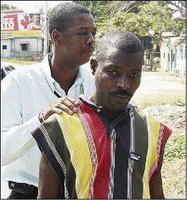Myrtha Désulmé, Contributor 
Désulmé
Although the headlines of the "drive-by media" would lead us to believe that the relationship between Haiti and Jamaica is limited to the rather grim concerns of the guns-for-drugs trade, and the no-room-at-the-inn policy adopted by the Jamaican Government vis-à-vis the beleaguered refugees seeking asylum from political turmoil, and its attendant economic disruption, these two sister nations actually share a long and fascinating history.
The romanticism, beauty, and tragedy of the history of the Haitian people cannot be lost even on the most cynical among us. Haiti's tragedy is that, unlike other nations, her long-suffering people, though christened in glory, have yet to be allowed to reap the benefits of the heroism of their founding fathers, who, accomplishing a feat unparalleled in human history, established the foundations of universal freedom in the modern world. Destiny, however, would decree that Haiti should be born at the wrong place, at the wrong time: black revolutionary in a world dominated by Eurocentric fanaticism, which would pay a heavy price for ushering in the New World Order. As Haiti's closest offshore neighbour, and its gateway into the British West Indies and the rest of the Caribbean, Jamaica, 161 kms to the southwest, has shared a tumultuous and time-honoured adventure with Haiti.
Haiti and Jamaica were, in fact, born as two squabbling siblings, heirs to the legendary rivalry of their parents, France and Britain. In 1791, Boukman Dutty, a Jamaican slave sparked an insurrection in St Domingue (now Haiti), which would lead to an apocalyptic 13-year War of Independence. Desperate to contain and suppress a revolution so close to Jamaica, the British invaded. The military genius of Haitian leader, Toussaint L'Ouverture, inflicted a crushing defeat on General Thomas Maitland, who signed a secret treaty declaring Toussaint an independent ruler, before retreating in October 1798.
Greatest impact

Haitian refugee being arrested on a Portland main road on Friday, March 11, 2005. - File
The greatest impact of the revolution on Jamaica was the inflow of the émigrés. At the first spark of the revolution, white planters and free coloureds fled St Domingue, many taking their slaves with them. Some 3,000 came to Jamaica. The advent of the émigrés struck fear into the hearts of the Jamaican authorities and planto-cracy, resulting in hostility and resistance. From the approximately 1,200 white French émigrés, they feared the spread of the French Revolution's republican ideology. They perceived an even greater threat, however, from the free coloureds and the slaves, which was the disruption of security, and of the political, economic and class structure of Jamaica, in other words, their entire way of life.
The plantocracy's "terrified consciousness" regarding unfolding events in Haiti, and their suspicion and paranoia towards the émigrés resulted in the incorporation of the City of Kingston in 1802, to allow for greater juridical powers in the establishment of security measures. Two prominent émigré businessmen, Lecesne and Escoffery, accused in 1823 of plotting a rebellion, were expelled. Taking their case to London, they were exonerated by the British Government, and returned to Jamaica as heroes. This cause célèbre greatly influenced the Removal of Civil Disabilities Act, passed in 1830 by the Jamaica House of Assembly, granting full political and civil rights to all free persons. The free coloured and black émigrés would play a vital role in the Jamaican struggle for civil liberties.
Over time, the émigrés assimilated. Some of them were merchants, others were planters. They brought with them skills and technology for the cultivation of premium coffee, which established Jamaica as amajor player in the coffee market. The Duperly family greatly contributed to Jamaica's photographic history. The émigrés also re-established the Catholic Church in Jamaica. Their descendants bear names like Chevannes, De la Haye, Desnoes, De Roux, Ducasse, Duquesnay, Espeut, Lattibeaudiere, Legrand, Malabre, Narcisse, Terrelonge, and Vendryes.
In 1881 the British Consul estimated that 2000 Jamaicans were residing in Haiti. Fourteen Haitian presidents and two would-be presidents would seek exile in Jamaica. Four of them died here, and Geffrard Place is named after President Fabre Nicholas Geffrard.
In 1957, Francois 'Papa Doc' Duvalier rose to power hailed by the peasantry and the black intelligentsia alike. The euphoria soon evaporated, in the face of a stark descent into bloodthirsty corruption. The Haitian elite and intellectual classes migrated in droves. Member of Parliament Thomas Désulmé chose exile in France.
In 1962, a newly independent Jamaica was booming economically. After settling his family in Paris, Desulme, an industrialist, who had had to abandon his pioneering plastics factory in Haiti, became enthused about the exciting prospects he perceived, to once more invest in the manufacturing industry. He settled in Jamaica, establishing an innovative petro-chemical plastics enterprise, which would revolutionise the industrial sector.
Diplomatic relations
Diplomatic relations between Haiti and Jamaica were first established on 26 August, 1981. Jamaica has since been at the forefront of Haiti's integration into CARICOM.
In 1986, the Duvalier dynasty was toppled in an explosion of long-suppressed anger. The Unitedt States and Jamaica's Eddie Seaga nego-tiated Jean-Claude Duvalier's departure. The popular uprising which ejected 'Baby Doc' swept to power a firebrand priest by the name of Aristide, who would be overthrown twice.
In 2004, a multilateral coup, disguised as a popular rebel uprising, toppled Aristide, driving his followers into a frenzy. For fear of a bloodbath, if he remained too close, Aristide was bundled off across the globe, to the Central African Republic. He requested asylum in Jamaica, to be reunited with his two young daughters, who had been left behind in Florida.
In the face of United States threats, and local pressure from sectors trembling in their boots in anticipation of US retaliation, then Prime Minister P.J. Patterson, recognising that the independence of the Caribbean rested on this critical affirmation of both Haiti's and Jamaica's sovereignty, courageously extended the hand of friendship to the deposed leader, offering Aristide a 10-week asylum.
Interim Prime Minister Gerard Latortue cut off diplomatic relations with Jamaica, over the granting of asylum to Aristide, and Haiti was suspended from CARICOM. In 2006, after the election of President René Preval, Haiti rejoined CARICOM.
On January 3, 2007, Preval and Prime Minister Portia Simpson Miller deepened diplomatic ties when Preval visited to engage in bilateral talks, exploring greater cooperation in areas such as tourism, agriculture, education and training, institutional strengthening, social infrastructure improvement, the activation of the Joint Jamaica/Haiti Commission, and the measures for Haiti to join the CARICOM Single Market & Economy (CSME).
The Tourism Co-operation Agreement, facilitating exchanges and mutual assistance in tourism, has made great progress. In November 2007, a CARICOM representational office was opened in Haiti. In December, Haiti ratified the Revised Treaty of Chaguaramas, clearing the way for full participation in the CSME. Haiti's nine million population, and its virgin market, constitute a tremendous business potential, as demonstrated by Digicel's assertion that Haiti is its most lucrative Caribbean market.
UWI students project
The 2007-2008 UWI Guild of Students have conceptualised an unprecedented project called "Roots to Haiti ... nurturing integration" project, to foster educational integration between Haiti and the University of the West Indies, and to promote student-centred volunteerism in Haiti. Three of the key driving forces of this project reflect the objectives of the Haiti-Jamaica Society: The opening up of Haiti to the rest of the Caribbean, the promotion of support for Haiti within the Caribbean, and the development of a positive perception of Haitian culture.
Myrtha Désulmé is president of the Haiti-Jamaica Society myrtha2004@yahoo.com or columns@gleanerjm.com

